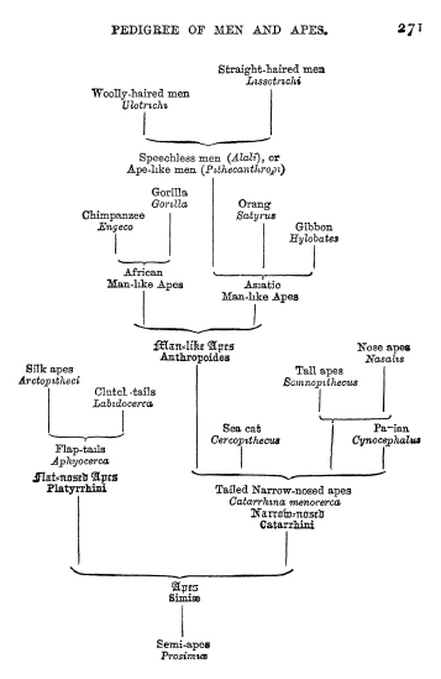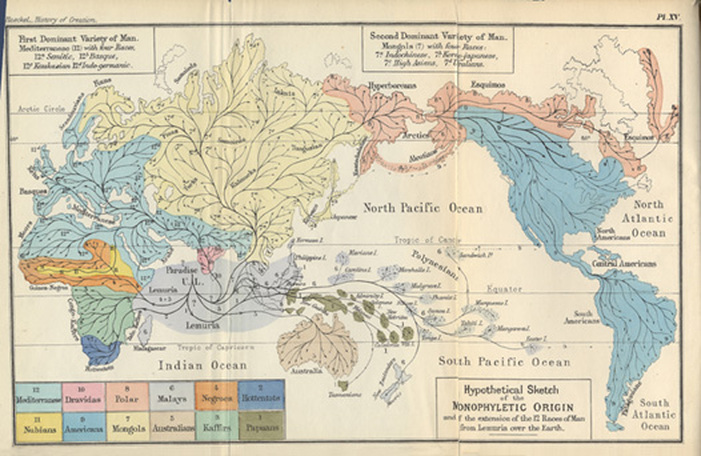This post about Ernst Haeckel and the lost continent of Lemuria is one I started a long time ago. I'm going to wrap it up and post it to get it out of my "draft" box.
Ernst Haeckel (1834-1919) would easily make any reasonable list of the Top Ten Most Racist Anthropologists. A biologist by training, Haeckel regarded the various "races" of humans as being distinct species that evolved from some hypothetical, pre-language "primaeval ape-man" (Homo primeginius). He arranged his twelve living species of humans hierarchically. Unsurprisingly, Caucasians (including Indo-Germans) were at the top of the heap. While Haeckel was clearly a racist, it is not clear exactly how his ideas contributed to the rise of Nazism (see this essay for one treatment).

"These Ape-like men, or Pithecanthropi, very probably existed towards the end of the Tertiary period. They originated out of the Man-like Apes, or Anthropoides, by becoming completely habituated to an upright walk, and by the corresponding stronger differentiation of both pairs of legs. The fore hand of the Anthropoides became the human hand, their hinder hand became a foot for walking. Although these Ape-like Men must not merely by the external formation of their bodies, but also by their internal mental development, have been much more akin to real Men than the Man-like Apes could have been, yet they did not possess the real and chief characteristic of man, namely, the articulate human language of words, the corresponding development of a higher consciousness, and the formation of ideas. The certain proof that such Primaeval Men without the power of speech, or Ape-like Men, must have preceded men possessing speech, is the result arrived at by an inquiring mind from comparative philology (from the "comparative anatomy "of language), and especially from the history of the development of language In every child ("glottal ontogenesis ") as well as in every nation ("glottal phylogenesis ").
. . . As, according to the unanimous opinion of most eminent philologists, all human languages are not derived from a common primaeval language, we must assume a polyphyletic origin of language, and in accordance with this a polyphyletic transition from speechless Ape-like Men to Genuine Men."
Notice that Haeckel's family tree classifies the ancestor of humans as an Asian ape closely related to gibbons and orangutans. Haeckel was writing at a time when fossil evidence of human evolution was still incredibly thin: the few Neanderthal remains that had been found in Europe were not well understood, and Eugene Dubois' (1891) discovery of fossils in Java (now classified as Homo erectus) was still in the future. In short, there was no consensus about what the fossils of a human ancestor would look like or where in the world they should be found. In this vacuum of fossil evidence, Haeckel relied on the study of linguistics of living peoples to reconstruct human evolution.
If all of this sounds rather quaint and harmless, read on in Haeckel's treatise to understand the implications of his understanding of linguistic and physical variation among human populations (1887:307-310):
"[The Ulotrichi, or woolly-haired men] are on the whole at a much lower stage of development, and more like apes, than most of the Lissotrichi, or straight-haired men. The Ulotrichi are incapable of a true inner culture and of a higher mental development, even under the favourable conditions of adaptation now offered to them in the United States of North America. No woolly-haired nation has ever had an important " history.""
Wile Haeckel saw linguistic variation in human populations as polyphyletic (marking development since the divergence of humans species from a common ancestor), he recognized that the human lineage must ultimately be monophyletic (descended from a common ancestor) and therefore have some geographic place of origin. Turning to the question of where in the world the common ancestor of humans originated, Haeckel (1887:326) rejects the existing continents as the location of "Paradise" (i.e. "the cradle of the human race") and proposes that the lost continent of Lemuria makes the most sense:
"But there are a number of circumstances (especially chorological facts) which suggest that the primaeval home of man was a continent now sunk below the surface of the Indian Ocean, which extended along the south of Asia, as it is at present (and probably in direct connection with it), towards the east, as far as further India and the Sunda Islands; towards the west, as far as Madagascar and the south-eastern shores of Africa. We have already mentioned that many facts in animal and vegetable geography render the former existence of such a south Indian continent very probable. (Compare vol i. p. 361.) Sclater has given this continent the name of Lemuria, from the Semi-apes which were characteristic of it. By assuming this Lemuria to have been man's primaeval home, we greatly facilitate the explanation of the geographical distribution of the human species by migration."
This falsification of the idea of Lemuria is science in action. As racist as Haeckel was, I bet that he still would have adjusted his ideas about human evolution in the face of direct fossil evidence or the knowledge that there was no such thing as Lemuria. In regards the "paradise" of Lemuria, Haeckel (1887:325) acknowledged that
"I must premise the remark that, in the present state of our anthropological knowledge, any answer to this question must be regarded only as a provisional hypothesis."
In the absence of direct evidence, it is possible to construct multiple narratives to explain the past and what it has to do with the present. The lack of direct evidence allows many mutually-exclusive ideas to be simultaneously regarded as credible. Science works by developing lines of evidence that allows some of those ideas to be tested and potentially falsified. This is why Lemuria was a fine idea in the late 1800's but is a nonsense one now. And this is why what we now know about human evolution and variation shows Haeckel's ideas about different human "species" as the inherently racist constructs that they are.
Science works by letting facts kill ideas. Lemuria went down in smoke a long time ago, as did the idea that there are deep biological/cognitive differences between modern human populations. If you are holding on to either of these ideas, you should ask yourself why.



 RSS Feed
RSS Feed
